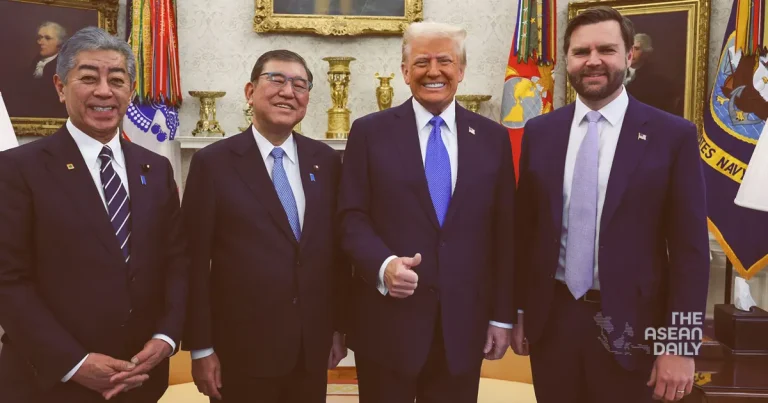10-2-2025 (WASHINGTON) Japanese Prime Minister Shigeru Ishiba and US President Donald Trump delivered a stern rebuke to China during their summit meeting in Washington on Friday, marking a robust reinforcement of the US-Japan alliance amidst growing regional tensions.
The leaders issued an unusually forceful joint statement addressing Beijing’s increasing military assertiveness around Taiwan and maritime activities in the Indo-Pacific region. The declaration represents one of the most direct challenges to Chinese territorial ambitions from the longstanding allies in recent years.
In a notable departure from traditional diplomatic language, the statement explicitly named China whilst expressing “strong opposition” to what both leaders characterised as Beijing’s coercive actions in the East and South China Seas. The document also took an unprecedented stance on Taiwan, with both leaders firmly rejecting any unilateral attempts to alter the status quo through force.
The summit yielded substantial security commitments, with Trump warmly endorsing Japan’s ambitious defence spending plans. Tokyo’s pledge to double its defence budget to 2% of GDP by fiscal year 2027 received explicit American support, marking a historic shift in Japan’s military posture since World War II.
Central to the discussions was the reinforcement of Article 5 of the US-Japan Security Treaty, with both leaders reaffirming its application to the disputed Senkaku Islands in Okinawa Prefecture. The agreement will see enhanced military cooperation, including upgraded command structures and an expanded military presence across Japan’s southwestern island chain.
“We are witnessing a profound strengthening of the US-Japan alliance,” said Dr. James Morton, Director of East Asian Studies at Georgetown University. “This joint statement signals a clear shift towards a more assertive posture in containing China’s regional ambitions.”
The leaders also outlined plans for enhanced multilateral cooperation through the Quad framework, involving Australia and India, as well as trilateral partnerships with South Korea and the Philippines. This approach appears to maintain the strategic direction established during the Biden administration, despite Trump’s previous scepticism of multilateral engagements.
Both nations agreed to convene a “two-plus-two” security meeting between their foreign and defence ministers in the near future, underlining the urgency of their security agenda. The talks also confirmed the contentious relocation of the US Marine Corps Futenma air station to Henoko in Okinawa Prefecture.
North Korea featured prominently in discussions, with both leaders recommitting to the peninsula’s complete denuclearisation. Trump notably pledged support for Japan’s ongoing efforts to resolve the issue of Japanese citizens abducted by North Korea, a matter of profound importance to the Japanese public.




